One of the oddest things to come out of the Sony hack last year was the revelation that Channing Tatum was angling to do his own guy-centric Ghostbusters movie with real life best bud Chris Pratt, not as a competing project to Paul Feig’s all-female version but as part of a new shared cinematic universe. He had brainstormed ideas with the Russo brothers (Captain America: The Winter Soldier), who were attached as producers, and was excited about making simultaneously super scary, super funny movies about paranormal investigators saving the world. It was hard for many to take any of that too seriously, not when Tatum’s actual email on the subject read as follows: “Let us show the world The DarkSide and let us fight it with all the glory and epicness of a HUGE BATMAN BEGINS MOVIE. I know we can make this a huge franchise. Fun adventure craziness. COME OONNNN!!!”
The Reportedly “Guy-Centric” Ghostbusters
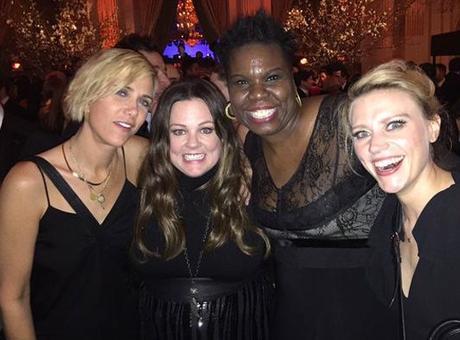
Wiig, McCarthy, Jones, McKinnon – The gals getting undercut by the guys?
It turns out that all of that was deadly seriously, funny Tatum emails and all. According to Deadline, Sony is partnering with Ivan Reitman and Dan Aykroyd to produce a “guy-centric” Ghostbusters movie to be written by Iron Man 3’s Drew Pearce, directed by the Russo brothers, and starring Tatum, who will also serve as co-producer. This will be part of a new Ghostbusters shared cinematic universe. Paul Feig’s all-female version with Kristin Wiig, Melissa McCarthy, Leslie Jones, and Kate McKinnon will start filming this summer and come out July 22, 2016, at which point the Tatum Ghostbusters should already be filming in anticipation of a summer 2017 release.
Out of all that, it was the “guy-centric” part which seemed to instantly annoy everyone yesterday. When discussing it with a friend, we did pretty instantly start cracking jokes about how the team-up film would be like the equivalent of everyone’s first boy-girl dance. We couldn’t wait to see which of the boys would turn out to secretly love dancing, ala Neville Longbottom in Harry Potter and The Goblet of Fire. Of course, as the alpha female of the group Kristin Wiig would be the one to ask Channing Tatum to dance, not the other way around, because that’s how they’ll show us just how progressive these new women are. Maybe they can split the guys and girls up and have them sing updated lyrics for “Summer Lovin” from Grease, Wiig as Sandy, Tatum as Danny Zuko:
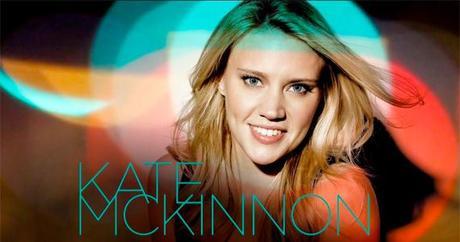
Age-wise, the 31-year-old Kate McKinnon is probably the more appropriate partner for the 34-year-old Tatum.
The Not So “Guy-Centric” Channing Tatum/Chris Pratt Team-Up
Well, screw all of our “At long last, can’t our Ghostbusters be co-ed?” jokes because Devin at BadAssDigest followed up with several people at Sony who claim to have no idea where the “guy-centric” part came from. He was told the Tatum project is in no way all-male; it will simply have two guys at its center, Tatum and Pratt, whose real life friendship and easy-going rapport has meant they’ve always wanted to do a big movie together. So, “this isn’t a case of ‘everybody wants Chris Pratt in their movie,’ this is a case of these two guys being pals and wanting to make this movie together.” Furthermore, he was told this idea of building a shared cinematic universe has been the plan from the beginning (that’s totally inconsistent with the Sony hack, though), building this as a series of branded supernatural FX comedies with a bit of tonal variety, i.e., they won’t necessarily just be busting ghosts. There will be four total films: Feig’s all-female thing, Tatum and the Russo’s thing, the mandatory team-up, and a prequel of some kind, though don’t expect it to somehow include the original Ghostbusters characters from the 80s. They hope to have a new Ghostbusters movie out every year.
The “Stop Re-Making Movies I Used to Love” Thing
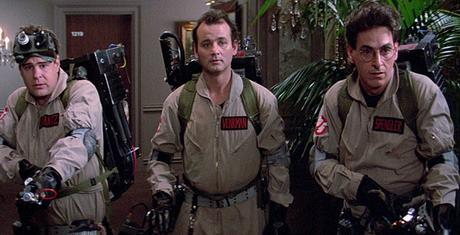
It’s not like they broke into your house and broke your Ghostbusters DVDs/Blu-Rays in front of you. Those old films remain exactly as enjoyable as they ever were.
So, at this point the new Ghostbusters has gone from one film to multiple films, invoking the “shared cinematic universe” clause which seemingly extends studio executives lives these days. Prior to this point, there was no shortage of op-eds discussing the merits of Paul Feig’s all-female Ghostbusters. I kept arguing if it wasn’t called Ghostbusters we’d probably be pretty excited based on all the talent involved, but by calling it Ghostbusters they dared to mess with nostalgia. The Dissolve’s Nathan Rabin argued that our childhood is not sacred, concluding, “Let’s at least allow the possibility, radical as it may seem, that these new versions of old favorites might be just as good as the movies we loved as kids. Maybe even better, even if they are suddenly full of cooties-carrying girl actors guilty of not being Bill Murray.”
Much like the on-going debate about the inevitability of superhero movie fatigue, the “Stop re-making/re-booting movies/shows I loved when I was a kid!” discussion is one we are going to keep having for years. Risk-averse studios are increasingly reliant upon international dollars which translates, in part, to more of a need for movies which look real pretty and have lots of action because those things can transcend language barriers (just look at what Jupiter Ascending did in China even though everyone in the US seemed to hate it). It also puts an emphasis on backing popular properties everyone knows. If you write about these things for a living you basically just need to write your standard essay on the topic, cut and paste the latest remake/reboot of the moment in your opening paragraph, and call it good, unless your personal opinion on the subject changes. One month it was the Ghostbusters, the next month it was a Chris Pratt Indiana Jones directed by Steven Spielberg, a month later it was a Blade Runner sequel, and then a couple of weeks later it was Neil Blomkamp and Sigourney Weaver’s odd new Alien project.
The Shared Cinematic Universe Debate
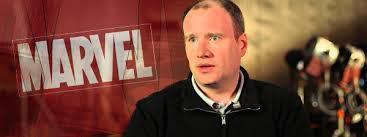
What hath thou wrought, Marvel Studios’ Kevin Feige?
Well, now Ghostbusters has transitioned from simply being part of one trend (the remake/reboot) into being part of another equally monolithic trend (the shared cinematic universe). Marvel has its own thing going, which encompasses both its films and TV shows. Warner Bros. has what fans are calling the DC Cinematic Multiverse, referencing how the live-action superhero movies planned through 2020 will share a universe, the direct-to-video animated movies like Justice League: War and Justice League: Throne of Atlantis share their own universe, and TV shows like Arrow and The Flash have their own universe and future shows like Supergirl and Teen Titans may have their own universes as well. Universal is trying to build up its old movie monsters into a shared universe, and although the first entry out of the gate, Dracula Untold, was a domestic flop it soared to over $200m worldwide on a $70m production budget. There were whispers at one point of doing a Godzilla/King Kong shared universe where the upcoming King Kong prequel Skull Island would somehow relate to last year’s Godzilla reboot, setting the stage for a Godzilla vs. King Kong showdown. Earlier this year, film studio Cinedigm joined the game by announcing a plan to create a 10-film franchise based on the sleaze-tastic 1950s B-movies of American International Pictures like Teenage Caveman, Girls in Prison, The Brain Eaters, and The Cool and the Crazy.
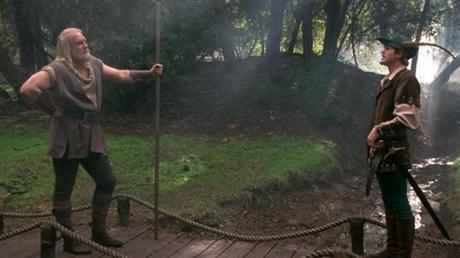
Would you watch a movie just about Little John?
This isn’t even Sony’s first or second crack at this. They posted a pretty epic-fail with their efforts to build a Spider-Man universe out of the Andrew Garfield Amazing Spider-Man movies, the odd cabal of writers hired to shepherd that universe rather quickly scattering, several of them oddly ending up being hired by Universal for its “let’s team up Dracula, The Mummy, and Frankenstein” thing. Then, late last year we discovered Sony was seriously considered doing something called Hood, wherein Robin Hood and his Merry Men – Little John, Friar Tuck, Will Scarlett – would be re-envisioned as an Avengers-style team of heroes from England’s Middle Ages, each getting their own solo film in addition to one (or more) team-ups. The Sony hack also revealed they were seriously discussing a 22 Jump Street/Men in Black team-up movie, which may still be on the table. The problem is that this is the age of the franchise, and Sony doesn’t have a lot of those outside of James Bond. So, basically, they’re desperate, and they suck so hard at this that Marvel Studios is bailing them out with their Spider-Man problem.
Someone who’s quite deeply involved with this kind of thing came out last year as being a bit critical of the trend. In a Facebook post entitled Carts Before Horses & Hollywood’s New Love of Shared Universes, Guardians of the Galaxy’s James Gunn argued:
Listen, I love big ass shared universes in movies, as well as huge franchises. But I’m a little worried about the numerous shared universes being planned by the studios, without having a strong base film to grow from – or in some cases, NO base film to grow from. Star Wars had the original Star Wars, the Marvel Universe had the original Iron Man, the Dark Knight series had Batman Begins, even movies like Transformers and Twilight – these were movies audiences loved, and the audiences demanded more from these characters. But these days studios are trying to grow trees without a strong seed. Execs and producers and sometimes even directors are focused on the big picture, without perfecting the task directly in front of them – making a great movie. And studios are trying to grow franchises from non-existent films or middling successes. It’s like they aren’t taking audiences into account at all anymore.
I know George Lucas, Kevin Feige, John [sic] Favreau, etc, had ideas where their films would potentially lead in the face of success. But I don’t think it ever got in the way of making that first movie count as if it was the last, of making it something wonderful that people would love whether it led to other films or not.
In short, I think this new business model is flawed. I think filmmakers and studios should be prepared for the big picture, but never, ever let it get in the way of making a single great film. Be a little more experimental and see what works as opposed to trying to force success. And mostly, remember that we as an industry exist to serve the audiences, to communicate with them – they have a voice in what we create as well. We are not here to dictate what they want to see, mostly because that’s simply not possible.
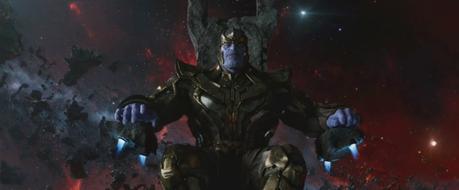
Maybe having your universe’s big bad establshed as someone who does nothing but sit in his chair as everyone around him betrays him was not the best route to take
That’s coming from someone who was forced to shoehorn several scenes with Thanos and an entire sequence explaining Infinity Stones as a way of connecting his Guardians of the Galaxy to the wider Marvel Cinematic Universe, although I still loved the movie. The general anti-cinematic universe argument is that they led to films with identical story templates, scenes which serve no purpose other than setting up other franchise entries, largely flat visual designs, and increasingly, sometimes painfully long running times. Gunn’s trying to get at that from the moment of inception. He’s not criticizing the Marvel model, more the idea of clueless studio executives making trend-based business decisions when the content at hand doesn’t actually support a cinematic universe. It’s mostly a game of “Marvel is exempt from criticism because they’re the only ones who truly seem like they know what they’re doing.” There are those, though, who don’t totally feel the same.
The Dissolve’s Scott Tobias argued, “The cinematic universe model is just a boring way to make movies. At a time when studios are desperate to prevent audiences from migrating to their home theaters, they’re ironically embracing a model that’s as conservative and rigidly formatted as a TV show. When movies are made to look the same and work toward the same ends, the add-ons of 3-D, faux-IMAX, and Dolby Atmos just add amplification to stories better suited to living rooms.” His inspiration to write that was to reflect on the recent theatrical run of Dracula Untold. ScreenRant’s Ben Kendrick made the same basic argument last summer, his argument inspired by The Amazing Spider-Man 2. Go even further back and you’ll find plenty of similar arguments made around the time Marvel parted ways with Edgar Wright, seen by many at the time as an indication that the shared cinematic universe model is inherently averse to the type of artistic innovation Wright wanted to bring to Ant-Man. Go even further back and you’ll find those who were predicting failure the moment Sony announced plans to build Venom and Sinister Six out of Amazing Spider-Man 2. And so on and so on.
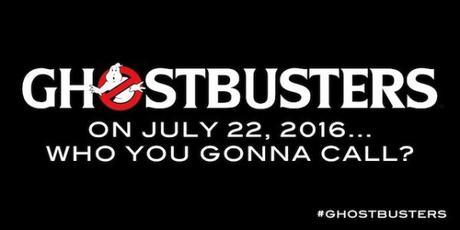
I can’t wait to see which Sony label recording artist gets to cover Ray Parker’s Ghostbusters song for the new movie’s soundtrack
In reality, all this really amounts to is a more coordinated method of franchise-building, a logical extension of long-held Hollywood practices and unavoidable result of “Avengers just made more money than God. How can we rip it off?” For Ghostbusters, that key “base film” Gunn referred to will be Paul Feig’s all-female one, and according to Devin at BadAssDigest the current script’s ending makes a lot more sense when you realize it’s setting up a shared universe. And luckily Sony has Ivan Reitman and Dan Aykroyd behind all of this, grouping them together in a new production company called GhostCorps which will set up shop on the Sony studio lot. Paul Feig and Katie Dippold are great choices for director and writer of an all-female Ghostbusters just as the Russo Brothers and Drew Pearce are people worth getting excited about for maybe more of a buddy-comedy Ghostbusters. So, there are reasons to be optimistic. There’s also your inevitable “Boy, what are they going to do if that Paul Feig movie sucks or is just okay or is actually great yet mysteriously underperforms at the box office? They’ll already be filming the quasi-sequel at that point” worries.
Years ago, I never would have thought that Ghostbusters would somehow find itself intersecting with two of the hottest trends of the moment, remakes and cinematic universes. There are strong feelings about both of those things, and when you add in the unique gender component of the new Ghostbusters, one all-female, another more co-ed but mainly about two guys, it all adds up to utter strangeness. It’s the kind of thing that some people are just going to be inherently incapable of taking seriously, just another familiar Hollywood story that inspires snarky Twitter jokes like, “Instead of making one Ghostbusters movie a year they should film part of one for 12 years and call it Ghosthood.” Yet Paul Feig, the Russo Brothers, Ivan Reitman, Drew Pearce…these are all good people to have behind all of this. There’s a chance that what ends up getting made may not suck, regardless of whichever Hollywood trends it’s a result of.
Sources: Deadline, BadAssDigest

